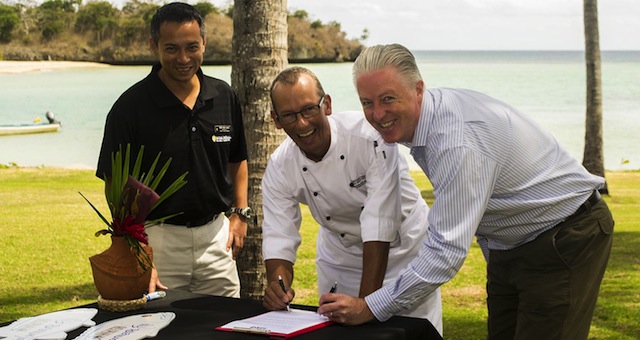InterContinental Fiji has become the first resort in the country to take the 4FJ Pledge not to serve kawakawa and donu during its peak breeding months, a move that will help boost these declining fish nationwide and improve the food security and income of communities across Fiji.
“As a business that takes its corporate responsibility seriously, we stand by our commitment to protect Fiji’s oceans, Fiji’s livelihood, and Fiji’s future,” said Erik Stuebe, Area General Manager, of InterContinental Fiji Golf Resort and Spa.
“We hope our participation in this campaign will encourage other resorts to join this cause, because as a sector, we have a tremendous opportunity to give back to the people of Fiji.”
Grouper, commonly known locally by names such as kawakawa and donu, are an important source of protein for communities. Kawakawa and donu are also commercially valuable and deeply ingrained in Fiji’s culture.
As Fiji’s population has grown and the demand for both food and income has grown, these fish are declining across the country, reducing the ability of communities to feed themselves and earn income.
What makes kawakawa and donu particularly extremely vulnerable to overfishing is how the fish reproduces.
During short periods each year, these fish swim from their home reefs, sometimes covering great distances, to gather in one place to spawn.
In Fiji, the peak months for kawakawa and donu spawning are June through September.
Traditionally, the spawning sites were well-known to local fishermen and provided good opportunities to fish them with minimal effort.
But in modern times, as fishing gear has improved and fishing pressure has increased, particularly for commercial sale, the unique spawning habits of these fish – gathering the same spot predictably each year – have made it easy to fish out large percentages of the population and leave too few to sustain the fishery.
The 4FJ campaign (short for For Fiji) launched in March as a grassroots movement that is asking people from all walks of life across the country to not eat, buy or sell these fish during their peak breeding months. More than 3,000 people have stepped forward to make the commitment to date.
As the campaign has gained momentum, some notable campaign champions are rugby legend Waisale Serevi, Ratu Filimoni Ralogaivau, chef Lance Seeto and Hindi broadcaster Veena Bhatnagar and fisherman Lisala Waqalala. More recently the campaign received the backing of the Methodist Church in Fiji, the largest religious institution in the country, and the Fiji Ministry of Defence, which said its pledge was a matter of national security as many communities throughout Fiji depending on fish for protein.
The InterContinental Fiji pledge is a major milestone for the campaign as it begins to more actively engage the business sector in Fiji, said Scott Radway, executive director of SeaWeb Asia Pacific, a communications nonprofit that created the campaign.
“The tourism sector is built on the unique experience visitors receive from Fiji’s rich island culture, a culture that is deeply intertwined with healthy ocean resources,” Radway said.
“For one of Fiji’s premier resorts to step up and make this pledge shows a gratitude to the people of Fiji that should be commended and provides tremendous leadership and encouragement for other resorts to join the movement.”
InterContinental Fiji, which employs more than 600 people, has also partnered with 4FJ to provide its staff and visitors the opportunity to make their own personal 4FJ pledge with an onsite pledge drive held today and tomorrow.


